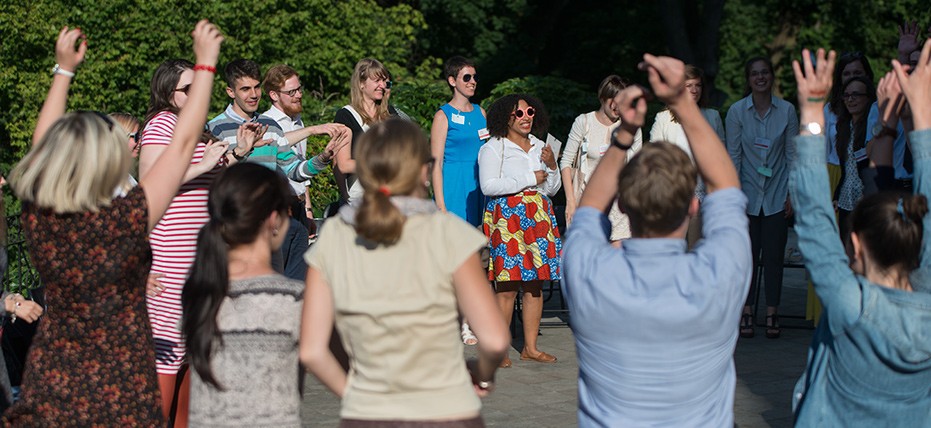
In the afternoon, an integration workshop took place on the large terrace of the Villa Decius. The heads of this workshop were the project manager of the Villa Decius Association Anna Kowalska, the career coach Olga Maksymenko and the director of the Malopolska Institute of Culture Joanna Orlik. In order to inspire creativity, Olga Maksymenko appealed to the audience: “Try to see the unseen! Not only in terms of contact and knowledge. “And she uttered the wish that one personal result for everyone after the VSS should be, that he or she could answer the question “What can I share, what can I give?“ Her advice: “Share talent, debate, arguments – and let's rock!“
As a little “ice-breaker“, the participants firstly got the task to collect signatures – of someone who speeks Polish, Czech, Slovakian and Hungarian respectively. Then, they set together in groups drawn by lot. They had to find out what interests they have in common in order to create a name and a symbol for their group. Finally, there were team “Sleepy boots“, team “90%“, team “Winerers“, team “Efficiency“ and team “Music travels through your mind“ – ready to pass through the five stations of the workshop in a rotating procedure, ready to be creative and to have fun.
Organizers were positioned at each station to give instructions. At one of the stations, the groups had to create a social media profile of “Homo Visegradicus“, an imagined person that combines the characteristics of all event members. Using newspapers, folders, pictures and markers with different colours, the participants brought peculiar mashups of “Homo Visegradicus“ profiles on the prepared schemas.
At the station “Acting our history“, the participants were supposed to perform – in the form of an improvised theatre's play – a significant historical scene of the region or being important for the region. Three of the groups chose Brexit. One group performed the Soccer Championship with rioting Russian fans, and another group presented Russia's Hybrid War by illustrating brainwashing due to propaganda. Most of the groups mastered this job really impressively and had a lot of fun!
“Who am I?“ was a station where each member of the groups received a piece of paper with the name of a famous person from or being important for Central Europe. The group had to guess who is who – with the aid of yes-/no-questions or with the aid of guestures the “person“ used to describe who she/he is. This game was very enjoyable for all of the groups.
The station “VSS is us – photo or film making“ demanded from the groups to make the words “Visegrad“, “Summer“ and “School“ from the group members' bodies – and then to take a photo of each of the words. At this station, there was also the opportunity to make a short film with the motto “VSS is us“.
Furthermore, there was a pub quiz station where the groups could prove their common knowledge or intuition in the categories “Visegrad countries“, “Central Europe“, „Villa Decius and Villa Decius Association“ and “Visegrad Summer School“.
After completing all stations, there were two prizes awarded: one for the best group in the game “Who am I?“ – congratulations to team “Music travels through your mind“ –, and one for the group with the highest score in the quiz – congratulations to team “90%“. Then, there was also the chance for each group to show what they liked most during the workshop. So, for example, team “Efficiency“ presented its brainwashing performance which illustrated Russian propaganda mechanisms within Hybride War, and the “Winerers“ showed the smart and entertaining film material they made under the headline “VSS is us“.
Fostering V4
Right in the middle of its progress, the integration workshop was interrupted for a while. This was the time for director Danuta Glondys to introduce Beata Jaczewska, the executive director of the International Visegrad Fund, to the participants. Beata Jaczewska then had the opportunity to present her institution. Of course it is not only the VSS that the International Visegrad Fund fosters, but there are plenty of projects, cultural and social likewise. The executive director began a listing which greatly appealed to the participants: The International Visegrad Fund works for the civil society of the Visegrad countries, supports individual monility, supports literary scholarships for students, supports the dialogue to V4's neighbours in the East and the Balkan countries, supports cooperation between universities in the V4 countries, supports artists, supports some research projects that comprise political analysis, provides social support for disadvantaged children, for minorities such as the Roma and so on and so on.
“This all sounds great“, one of the participants commented afterwards. “But it seems even to be to good to be true! Is it really on a longterm scale what you are doing?“, he asked. Beata Jaczewska's optimistic respond: “I don't think that we will stop to be neighbours to each other. As long as I got my basic money from the governments, I'm alive.“
Concerning the VSS, Beata Jaczewska remarked: “To my mind, the greatest advantage of the VSS is to meet people, to be open for other people's opinions.“ And with a twinkle in her eye, she also mentioned “marriages and children“ while appreciating the VSS as an opportunity to enable contacts and friendships.
by Jill-Francis Käthliz













